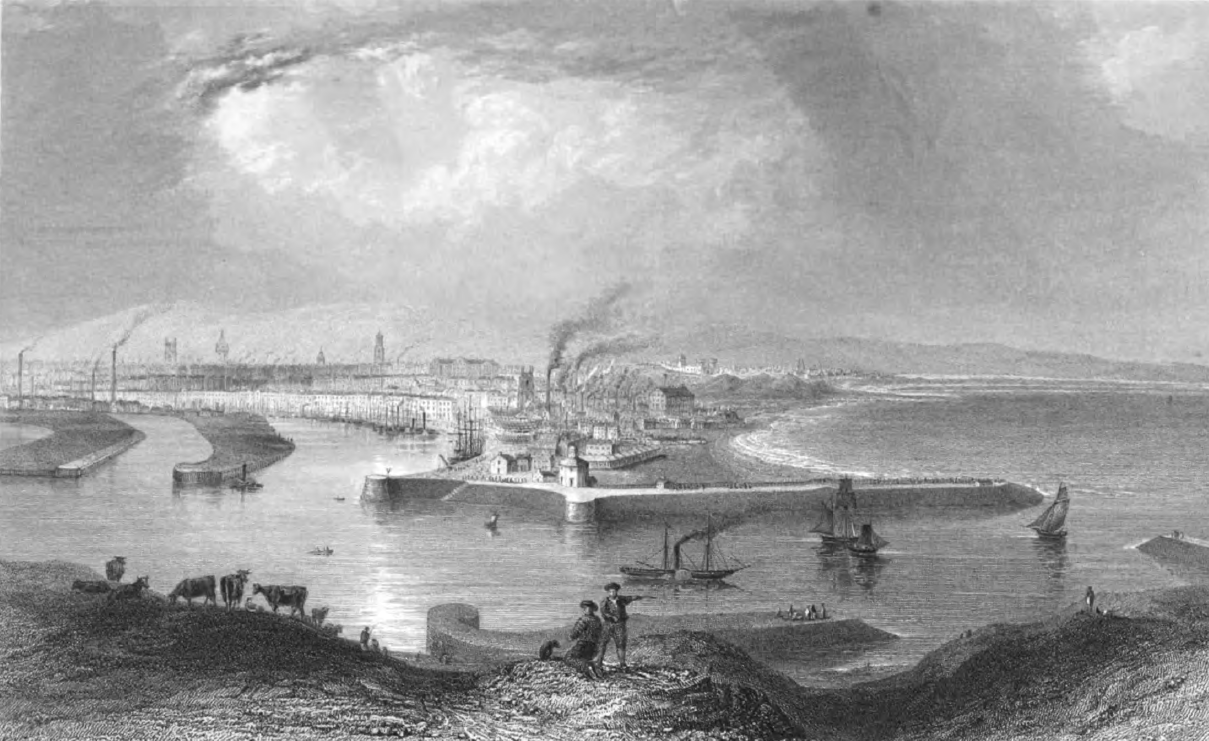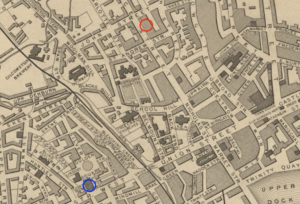
Following the three meetings in Montrose the previous week, Frederick Douglass and James N. Buffum headed north to Aberdeen, arriving on Monday 2 March 1846.1 In a letter to his publisher in Dublin, the abolitionist Richard D. Webb, Douglass wrote: ‘My first meeting in this place will take place this evening. We shall probably hold three meetings here – and from here return to Montrose – hold one more meeting there, touch at Dundee – hold a meeting – at Perth and hold another meeting – and from there return to Glasgow’ where he expects to arrive on 14 March. By then he very much hopes to take delivery of more copies of his Narrative to sell at his lectures.2
Two short reports covering all three of these meetings appeared in the Aberdeen Journal and in the Aberdeen Herald. They do not provide a detailed account of what was said, but, with Douglass’ letter, they do allow us to state with some certainty that Douglass spoke at the Bon-Accord Music Hall on George Street (marked red on the map below) on Monday 2 March and at the Assembly Rooms on Union Street (marked blue) on Friday 6 March. If three meetings were held, as Douglass hoped, it is likely that a third would have taken place between these two dates, at one or other of the two venues.3

It was but the other day I was in Aberdeen. There it appeared at first as if the hearts of the people were as hard as the granite of which their houses are built; but we had been there only two evenings before they flocked out to know what was the matter – to learn the head and front of the Free Church‘s offending; and we have the pleasure of informing you that, before we left, there was not a house which would contain the numbers that came. They saw, when I had read my charges against the Free Church, that I had business among them; and, instead of attempting to silence me, a petition signed by a large number of most respectable citizens, wanting to hear more on the subject, was put into our hands previous to our departure.4
The reports make no mention of Buffum, but the ‘we’ of Douglass’s letter suggests that he did address the meetings alongside him in Aberdeen, as Buffum himself does in a later letter summarising his activities from January to March.5
ABOLITION OF SLAVERY.– Mr. F. Douglass, a man of colour, who escaped from slavery in Maryland, has been lecturing in this place, on the subject of slavery, during the past week. Mr. Douglass seems to be no ordinary man. His struggles to educate himself during the period of his slavery, where the circumstance of a slave learning even to read and write is very remarkable, in face of every means that his taskmaster can devise of preventing such a thing. Yet Mr. Douglass continued to educate himself, and, after much suffering, effected his escape from the Southern to the Northern States, where he was safe from pursuit. He is now an accredited and much-esteemed missionary of the American abolitionists. His lectures (which have been delivered in the Music Hall, George Street, and yesterday in the Assembly Rooms) were most interesting. His own personal sufferings are graven deep in his mind, and give a depth of earnestness to his denunciations of slavery that cannot fail to stir up the deepest horror for the slaveholder and sympathy with his unfortunate victims.
Aberdeen Herald and General Advertiser, 7 March 1846
ABOLITION OF SLAVERY.– Mr F. Douglass, a man of colour, who escaped from slavery in Maryland, has been lecturing in this place on the subject of slavery, during the past week. Mr Douglass seems to be no ordinary man. His struggles to educate himself during the period of his slavery, where the circumstance of a slave learning even to read and write is very remarkable, in face of every means that his taskmaster can devise of preventing such a thing. Yet Mr Douglass contrived to educate himself, and, after much suffering, effected his escape from the Southern to the Northern States, where he was safe from pursuit. He is now an accredited and much-esteemed missionary of the American abolitionists. His lectures (delivered in the Music Hall, George Street, and in the Assembly Rooms) were most interesting. His own personal sufferings are graven deep in his mind, and give a depth of earnestness to his denunciations of slavery that cannot fail to stir up the deepest horror for the slaveholder and sympathy with his unfortunate victims. Mr Douglass denounced, in strong and eloquent language, the conduct of the Free Church party, who had taken money from the slaveholders in America to assist in building their churches; thereby violating all Christian principle, encouraging the slaveholders in their iniquitous traffic, and seriously injuring the Anti-Slavery movement in the States.
Aberdeen Journal, 11 March 1846
Notes
- It is possible that the meetings were organised by the Aberdeen Emancipation Society, formed in 1836, although its allegiances were to the British and Foreign Anti-Slavery Society based in London which was suspicious of the Garrisonian abolitionists from the United States, such as Douglass. On abolitionism in Aberdeen, see C. Duncan Rice, ‘Aboliitionists and Abolitionism in Aberdeen: A Test Case for the Nineteenth-Century Anti-Slavery Movement,’ Northern Scotland, Vol. 1 No. 1 (1972): 66–87.
- Frederick Douglass to Richard D Webb, Aberdeen, 2 March 1846.
- The Aberdeen Journal merely names the venue as the ‘Music Hall, George St’. However, a notice in the Aberdeen Herald of 22 November 1845 publicised an event at the ‘Bon-Accord Music Hall (formerly the Temperance Hall) in George St’ (and another notice the previous week specified the address as 206 George Street). Moses Roper lectured in the same hall four months later (Aberdeen Journal, 8 July 1846). The hall was built around 1841. It should not be confused with the later ‘Bon-Accord Music Hall’ on St Nicholas Lane, which opened in 1888. The Assembly Rooms on Union Street were reconstructed in 1858-59 and reopened as the Aberdeen Music Hall, which still serves as a major entertainment venue today.
- Anti-Slavery Soiree: Report of the Speeches Delivered at a Soiree in Honour of Messrs Douglass, Wright, & Buffum, Held in George’s Chapel, Dundee, on Tuesday the 10th March, 1846 (Dundee: D. Hill, 1846), pp. 28–29.
- James N. Buffum to William Lloyd Garrison, Bowling Bay, 31 March 1846 (Liberator, 1 May 1846).